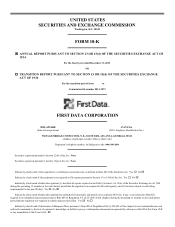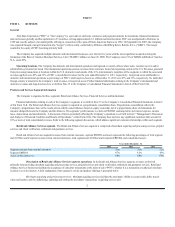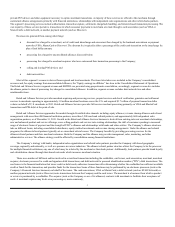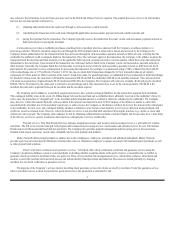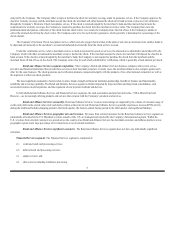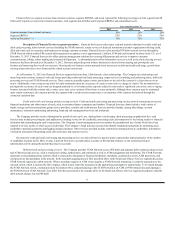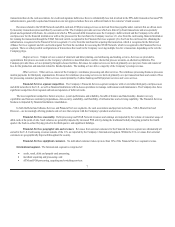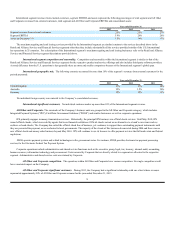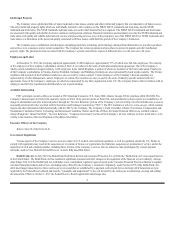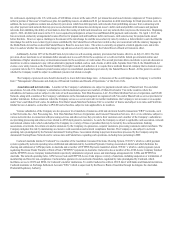First Data 2013 Annual Report Download - page 11
Download and view the complete annual report
Please find page 11 of the 2013 First Data annual report below. You can navigate through the pages in the report by either clicking on the pages listed below, or by using the keyword search tool below to find specific information within the annual report.
for card issuers operating in the U.S. with assets of $10 billion or more at the sum of $.21 per transaction and an ad valorem component of 5 basis points to
reflect a portion of the issuer’s fraud losses plus, for qualifying issuers, an additional $.01 per transaction in debit interchange for fraud prevention costs. In
addition, the new regulations contain non-exclusivity provisions which ban debit payment card networks from prohibiting an issuer from contracting with
any other payment card network that may process an electronic debit transaction involving an issuer’s debit cards and prohibit card issuers and payment
networks from inhibiting the ability of merchants to direct the routing of debit card transactions over any network that can process the transaction. Beginning
April 1, 2012, all debit card issuers in the U.S. were required to participate in at least two unaffiliated debit payment card networks. On April 1, 2013, the
ban on network exclusivity arrangements became effective for prepaid card and healthcare debit card issuers, with some leeway for prepaid cards issued
before that date. However, upon a challenge to the amount of the interchange fee and the non-exclusivity rules by retailers, a federal district court ruled that the
interchange fee and the non-exclusivity provisions established by the Federal Reserve Board are invalid as they are inconsistent with the statutory language in
the Dodd-Frank Act and has ordered the Federal Reserve Board to issue new rules. The action is currently on appeal in a federal appeals court, and at this
time it is unclear whether the current interchange fee cap and non-exclusivity rules issued by the Federal Reserve Board will remain in effect.
Additionally, Section 1075 of the Dodd-Frank Act provides two self-executing statutory provisions that became effective on July 22, 2010. The first
provision allows merchants to set minimum dollar amounts (not to exceed $10) for the acceptance of a credit card (while federal governmental entities and
institutions of higher education may set maximum amounts for the acceptance of credit cards). The second provision allows merchants to provide discounts or
incentives to entice consumers to pay with an alternative payment method, such as cash, checks or debit cards. Separate from Title X, the Dodd-Frank Act
creates a new entity, known as the Financial Stability Oversight Council, and authorizes it to require that a nonbank financial company that is deemed to pose
a systemic risk to the U.S. financial system become subject to consolidated, prudential supervision by the Federal Reserve Board. At this point it is unclear
whether the Company would be subject to additional systemic risk related oversight.
The Company experienced some benefit due mostly to lower debit interchange rates. A discussion of the overall impact on the Company is set forth in
Item 7 “Management’s Discussion and Analysis of Financial Condition and Results of Operations,” of this Form 10-K.
A number of the Company’s subsidiaries are subject to payment network rules of MasterCard, Visa and other
associations. Several of the Company’s subsidiaries in the International segment are members of MasterCard and/or Visa in the countries where the
subsidiaries do business and are subject to the rules of such associations. First Data Resources, LLC, First Data Merchant Services Corporation, and STAR
Network, along with a number of the Company’s subsidiaries in the International segment are registered with Visa and/or MasterCard as service providers for
member institutions. In those situations where the Company serves as a service provider to member institutions, the Company is not an issuer or an acquirer
under Visa’s and MasterCard’s rules. In addition, First Data Canada Merchant Solutions ULC is a member of Interac and subject to its rules and First Data
Global Services Limited is a subscriber to PULSE and is therefore subject to rules applicable to its members.
Various subsidiaries of the Company are also processor level members of numerous debit and electronic benefits transaction (“EBT”) networks, such
as Star Networks, Inc., Star Processing Inc., First Data Merchant Services Corporation, and Concord Transaction Services, LLC, or are otherwise subject to
various network rules in connection with processing services and other services they provide to their customers and a number of the Company’s subsidiaries
are providing processing and other services related to ATM deployment to customers. As such, the Company is subject to applicable card association, network
and national scheme rules, which could subject the Company to a variety of fines or penalties that may be levied by the card associations, banking
associations or networks for certain acts and/or omissions by the Company, its sponsorees, acquirer customers, processing customers and/or merchants. The
Company mitigates this risk by maintaining an extensive card association and network compliance function. The Company is also subject to network
operating rules promulgated by the National Automated Clearing House Association relating to payment transactions processed by the Company using the
Automated Clearing House Network and to various state and Federal laws regarding such operations, including laws pertaining to EBT.
Cashcard Australia Limited (“Cashcard”) is a member of the Australian Consumer Electronic Clearing System (“CECS”), which is a debit payment
system regulated by network operating rules established and administered by Australian Payments Clearing Association Limited and which facilitates the
clearing and settlement of ATM payments in Australia and a member of EFTPOS Payments Australia Limited (“EPAL”), which is a debit payment system
regulating Electronic Funds Transfer at Point of Sale (“EFTPOS”) payments in Australia. Cashcard is also a member of the ATM Access Company Limited
and the EFTPOS Access Company Limited which respectively administers reciprocal access and interchange arrangements for ATMs and EFTPOS in
Australia. The network operating rules, ATM Access Code and EFTPOS Access Code impose a variety of sanctions, including suspension or termination of
membership and fines for non-compliance. Cashcard also operates its own network of members, regulated by rules promulgated by Cashcard, which
facilitates access to CECS and EPAL for Cashcard’s member institutions. To enable Cashcard to settle in CECS direct with banks and financial institutions,
Cashcard maintains an Exchange Settlement Account (“ESA”) which is supervised by the Reserve Bank of Australia through its delegate, the Australian
Prudential Regulatory Authority
10

